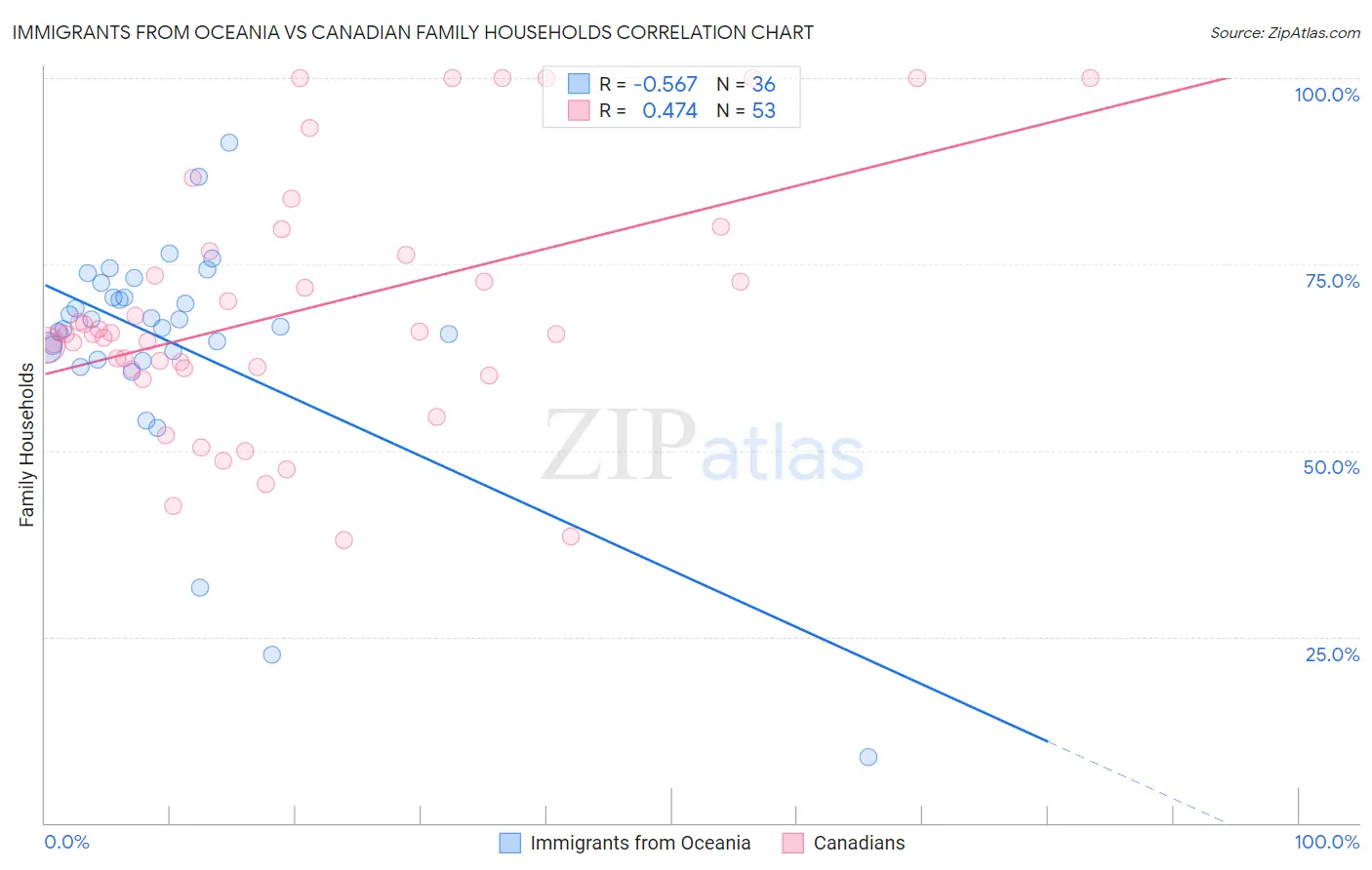Immigrants from Oceania vs Canadian Family Households
COMPARE
Immigrants from Oceania
Canadian
Family Households
Family Households Comparison
Immigrants from Oceania
Canadians
64.9%
FAMILY HOUSEHOLDS
94.2/ 100
METRIC RATING
120th/ 347
METRIC RANK
64.4%
FAMILY HOUSEHOLDS
66.6/ 100
METRIC RATING
157th/ 347
METRIC RANK
Immigrants from Oceania vs Canadian Family Households Correlation Chart
The statistical analysis conducted on geographies consisting of 305,389,085 people shows a substantial negative correlation between the proportion of Immigrants from Oceania and percentage of family households in the United States with a correlation coefficient (R) of -0.567 and weighted average of 64.9%. Similarly, the statistical analysis conducted on geographies consisting of 437,288,954 people shows a moderate positive correlation between the proportion of Canadians and percentage of family households in the United States with a correlation coefficient (R) of 0.474 and weighted average of 64.4%, a difference of 0.70%.

Family Households Correlation Summary
| Measurement | Immigrants from Oceania | Canadian |
| Minimum | 8.8% | 38.0% |
| Maximum | 91.4% | 100.0% |
| Range | 82.6% | 62.0% |
| Mean | 64.5% | 68.7% |
| Median | 67.1% | 65.6% |
| Interquartile 25% (IQ1) | 62.7% | 61.0% |
| Interquartile 75% (IQ3) | 71.6% | 76.5% |
| Interquartile Range (IQR) | 8.8% | 15.5% |
| Standard Deviation (Sample) | 15.4% | 16.5% |
| Standard Deviation (Population) | 15.2% | 16.4% |
Similar Demographics by Family Households
Demographics Similar to Immigrants from Oceania by Family Households
In terms of family households, the demographic groups most similar to Immigrants from Oceania are Immigrants from Eastern Asia (64.9%, a difference of 0.010%), Hungarian (64.9%, a difference of 0.010%), Hmong (64.9%, a difference of 0.050%), Choctaw (64.9%, a difference of 0.050%), and Dutch (64.9%, a difference of 0.060%).
| Demographics | Rating | Rank | Family Households |
| Spanish | 96.2 /100 | #113 | Exceptional 65.0% |
| Argentineans | 95.7 /100 | #114 | Exceptional 65.0% |
| Ecuadorians | 95.4 /100 | #115 | Exceptional 65.0% |
| Immigrants | Iraq | 95.4 /100 | #116 | Exceptional 65.0% |
| Cherokee | 95.3 /100 | #117 | Exceptional 65.0% |
| Dutch | 95.1 /100 | #118 | Exceptional 64.9% |
| Immigrants | Eastern Asia | 94.4 /100 | #119 | Exceptional 64.9% |
| Immigrants | Oceania | 94.2 /100 | #120 | Exceptional 64.9% |
| Hungarians | 94.0 /100 | #121 | Exceptional 64.9% |
| Hmong | 93.4 /100 | #122 | Exceptional 64.9% |
| Choctaw | 93.4 /100 | #123 | Exceptional 64.9% |
| Immigrants | Argentina | 92.8 /100 | #124 | Exceptional 64.9% |
| Immigrants | Belize | 92.7 /100 | #125 | Exceptional 64.9% |
| Panamanians | 92.4 /100 | #126 | Exceptional 64.8% |
| Immigrants | Panama | 92.0 /100 | #127 | Exceptional 64.8% |
Demographics Similar to Canadians by Family Households
In terms of family households, the demographic groups most similar to Canadians are Lebanese (64.4%, a difference of 0.0%), Czech (64.5%, a difference of 0.010%), German (64.4%, a difference of 0.010%), Uruguayan (64.5%, a difference of 0.020%), and Immigrants from Moldova (64.4%, a difference of 0.020%).
| Demographics | Rating | Rank | Family Households |
| Romanians | 75.3 /100 | #150 | Good 64.5% |
| Syrians | 75.2 /100 | #151 | Good 64.5% |
| Scottish | 70.9 /100 | #152 | Good 64.5% |
| Swedes | 69.8 /100 | #153 | Good 64.5% |
| Austrians | 68.5 /100 | #154 | Good 64.5% |
| Uruguayans | 67.7 /100 | #155 | Good 64.5% |
| Czechs | 67.0 /100 | #156 | Good 64.5% |
| Canadians | 66.6 /100 | #157 | Good 64.4% |
| Lebanese | 66.4 /100 | #158 | Good 64.4% |
| Germans | 65.8 /100 | #159 | Good 64.4% |
| Immigrants | Moldova | 65.2 /100 | #160 | Good 64.4% |
| Immigrants | England | 62.6 /100 | #161 | Good 64.4% |
| British | 61.6 /100 | #162 | Good 64.4% |
| Chickasaw | 61.5 /100 | #163 | Good 64.4% |
| Immigrants | Nigeria | 60.1 /100 | #164 | Good 64.4% |